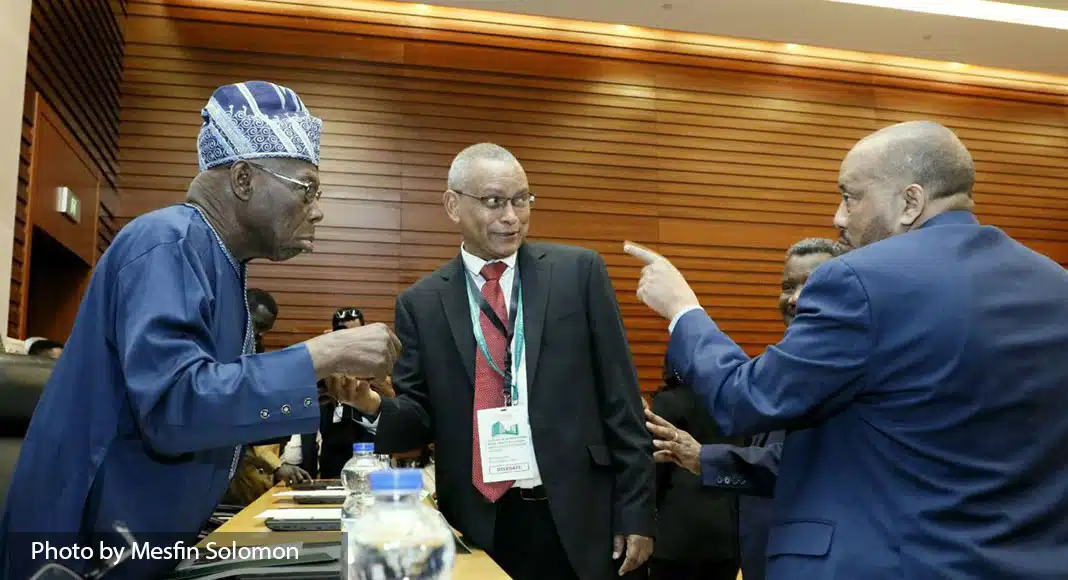
The African Union (AU) says that the absence of an impartial guarantor has held back the full implementation of the Pretoria agreement, leaving Tigray to grapple with outstanding issues such as the withdrawal of non-ENDF forces, the return of IDPs, and political disputes.
A 51-page document dubbed ‘Lessons Learned Report from the AU-Led Peace Process for the Tigray Region of Ethiopia’ acknowledges that “the absence of guarantors for the Permanent COHA highlights the limitations of facilitating institutions such as the AU in ensuring strict adherence to the terms of the agreement.”
Two lessons were curated from the coverage of the COHA, according to the document.
“The first was the issue of overloading the Agreement by combining immediate, medium and long-term objectives. The second lesson was the absence of guarantors. While the AU’s deployment of monitors has been largely applauded by the parties to the conflict, the lack of impartial guarantors deprived the COHA of an extra layer of oversight that would have been useful in the event of non-compliance,” it reads.
The report notes that the absence of guarantors has eroded the credibility and trust in the peace process.
– Advertisement –
Delays in the implementation of major clauses of the agreement two years after it was signed are brewing frustration and tensions in Tigray. During a discussion in Addis Ababa last Sunday, Tigray officials urged the AU to press for the full execution of the agreement.
“There are a number of issues we still have not addressed. DDR is one. But most importantly, the IDPs languishing across Tigray must return to the constitutionally mandated territories of Tigray,” said Getachew Reda, president of the Tigray Interim administration, during the meeting.
Debretsion Gebremichael, chairperson of TPLF, echoed the sentiments.
“The Pretoria agreement was a pivotal moment but we have to go a long way before its full implementation. Critical components like the constitutional restoration of Tigray’s territory, the withdrawal of non-ENDF forces from Tigray, the return of IDPs, and the reinstatement of TPLF legal party license, remains [to be done]. These require accelerated actions,” said the party chairman, calling for the AU to enhance verification and monitoring mechanisms.
Gedion Timothiwos, minister of Foreign Affairs, also urged for more direct dialogue “to make sure belligerent rhetoric has no place in national and regional discourse and reject overtures to or from spoilers of peace in our country, whether local or foreign.”
AU officials responded by acknowledging the work that remains to be done, and calling for concerned parties to remain steadfast in their commitment to the peace deal.
“Contested areas must remain neutral until the issue is resolved,” said Obasanjo.
However, this comment from Obasanjo was met by fierce rejection from opposition parties in Tigray, who have issued critical statements over the past week.
The AU report describes the steps taken following the outbreak of war in northern Ethiopia, detailing how peace talks were initiated and finally concluded in Pretoria, and highlights the successes and hiccups in implementing the terms of the peace deal.
The report praises the handling of the ceasefire and the provision of humanitarian aid in the war-torn region. It also hints that the story would have turned out differently if the case of the war was tabled to the UN Security Council at the time.
“Through regular briefings, the Commission also updated the AU PSC and the three elected African Members of the UN Security Council (the A3), which ensured Ethiopia was not formally placed on the UN Security Council agenda during the period. This prevented disruptions and helped the AU retain control of the process,” reads the report.
Reservations about Obasanjo on the side of the TPLF and the federal government were also another issue.
TPLF leaders harbored doubts about Obasanjo due to his perceived support for Prime Minister Abiy Ahmed, having been involved in the 2021 Ethiopian elections as the chair of the African Union Election Observation Mission (AUEOM) to Ethiopia.
His endorsement of the integrity of a seemingly non-inclusive election was deemed problematic as it signified support for the winner, according to the report.
Meanwhile, some on the federal government’s side also harboured reservations due to Obasanjo’s close relationship with the late Prime Minister Meles Zenawi. These reservations were brought to the attention of the AU.
However, according to the report, the reservations eventually gave way to a widespread acknowledgement of his immense experience and commitment to a mutually acceptable outcome.
The report also notes that a lack of passports and COVID-19 vaccinations also nearly affected TPLF members’ travel to South Africa.
“However, following the AU’s engagement with the Government of South Africa, immigration and vaccination issues were resolved in a timely manner,” it reads.
The federal government reportedly issued 11 passports to the TPLF negotiating team, according to report.
“Another key lesson was the imperative for flexibility by countries hosting mediation processes during health emergencies, as was the case with COVID-19 during the conflict in the Tigray region. There is a fine balance that needs to be maintained between enforcing public health regulations and fostering peace efforts,” it reads.
A deliberate leak of the negotiation venue by French media outlet Le Monde also nearly compromised the peace talks, according to the report.
“While it has been suggested that a successful holding of the pre-talks in Tanzania would have offered an earlier deal and paved the way for a broader political settlement, the dynamics surrounding the deliberate leakage of information regarding that potential venue by the French Daily, Le Monde, simply made that venue untenable. Consequently, the two parties, leveraging their ownership of the process, recommended to the AU to suggest five AU Member States among which a choice could be made. Based on consensus, they agreed on South Africa,” it reads.
The African Development Bank (AfDB) provided the finance required to organize the peace talks, states the report.
.
.
.
#Absence #Impartial #Guarantors #Hampers #Pretoria #Agreement #Implementation #Report
Source link











